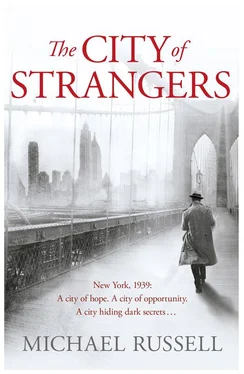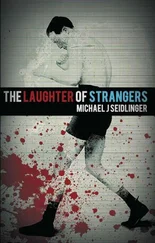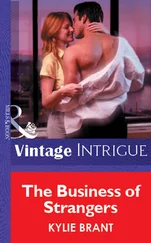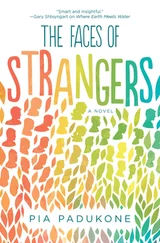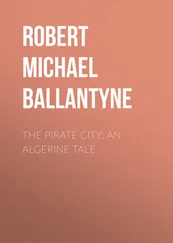1 ...7 8 9 11 12 13 ...23 The staircase wall, like the walls of the hall and the landing above it, was lined with pictures, maps, photographs; paintings of dogs and horses; faded prints of flowers; maps of Ireland, Britain, India, the Mediterranean. The mostly Victorian men and women who gazed out of the heaviest frames, with a mixture of confidence and disapproval, looked old whatever age they were. It was all heavy, dark, as if the images and colours lining the walls had faded into a uniform smog.
Dessie stopped as the staircase turned to the right, on to the landing, where the repeated pattern of the carpet stretched left and right along the corridor, between the gloomy, embossed walls and the grey-painted doors. It was lighter here though. A window gave on to Herbert Place below. Dessie was slightly breathless. A larger, elliptical chalk circle spread out on to the landing from the top stair; the bloodstains were clearer here.
‘She must have been carried out the bedroom. But the body was put down here a moment. There’s more blood on the walls up there, and on the pictures.’ Dessie gestured to the left, along the corridor, where several more prints and photographs hung at odd angles. ‘Either he put her down or he dropped her.’
Stefan looked. Dessie walked on past two closed doors.
The third door was open. Through it was a big bedroom as cluttered and claustrophobic as the hall and the landing. There were clear signs of a struggle: smashed ornaments, pictures knocked off the walls, a broken chair, a table on its side, sheets and blankets pulled across the big bed on to the floor. But where the smell in the hallway and on the landing was of polish and dust and years of airlessness, the smell here was of smoke and burnt wood; not strong but acrid and sharp.
Dessie took out a packet of Sweet Afton and lit a cigarette. Stefan walked into the centre of the room. There were two small rugs, though it was clear the rest of the floor had been covered until recently too. The floorboards were grimy with age but they had only been varnished at the edges of the room. A carpet must have covered the area in front of the bed, though it wasn’t there now. Close to the bottom of the bed the floorboards were blacker than elsewhere, charred. Stefan looked at the black patch and bent down. He rubbed something that was like charcoal on to his fingers.
‘Just in time, I’d say.’
Dessie nodded. ‘When the maid came in there was an electric fire on. It must have been going full pelt for a couple of days. The boards were starting to burn underneath. If she hadn’t come back when she did the place would have gone up so. She threw a bucket of water over it.’ He laughed and drew in some more smoke. ‘She fused the whole house, but it did the trick.’
‘So do you think it was deliberate? Starting a fire?’
‘I’d say not,’ replied Dessie. ‘There’d have to be better ways to do that. No, this was where she was killed and there was a lot of blood. Someone tried to clean it up. There’s soap mixed with the blood. The story is he put the fire on to dry the floor, then left. But as he never came back –’
Stefan was still looking down at the floor.
‘What happened to the carpet?’
‘The State Pathologist took some of the rugs and the bedclothes, but the carpet had gone already. Your man must have had it. It would have been soaked looking at what’s round the room. Maybe he brought it with him. Maybe he wrapped the body in it. There’s not a lot of blood in the car. She was on the back seat, so she must have been covered in something anyway.’
‘So with all this blood – she was stabbed? Is there a weapon?’
‘I’ll show you where the axe was. We’ll go out the back way.’
The garden that led down to the mews at the back of the house in Herbert Place was neatly kept, but it was bare and grey. Squares of grass and small, dark rhododendrons; tightly clipped bushes took up the flower beds. When the spring came there would be few enough flowers to give colour. Dessie pointed out several chalk-marked stains on the stone paved path that led to the two-storey mews; a little more blood to mark where the body had been half-dragged and half-carried from the house.
They walked through a door into the gutted stables that had once housed the family’s horses, and now smelt of the leaked engine oil that stained the stone floor. There were a couple of bicycles, some garden tools, a workbench full of spanners and wrenches, rusty and cobwebbed. Against one wall was a pile of cut turf, with sticks for the fires stacked beside it. Dessie stood by the turf and kicked at it.
‘There was a small hatchet here, under a pile of turf. There’s a gardener comes in now and again. He uses it for splitting wood for a bit of kindling. So it was kept in the garage. It had a good wash but there was still blood on it. They think it was maybe hot water, so instead of the blood running away it coagulated. They reckon it must be what killed her though.’
He walked across the empty garage to the double doors.
‘Mrs Harris’s car was kept in here. So he must have brought the body in, then shoved her on to the back seat. Bit tight in a Baby Austin. Timings aren’t very clear. Only one sighting of the car. It was probably dark when he left.’
Detective Sergeant MacMahon opened one of the doors.
‘Evening, night?’ asked Stefan as they walked out into the lane that ran behind Herbert Place. It was almost empty, as it must have been then.
‘Not late. Seven, maybe eight o’clock.’
Two boys were walking slowly along the lane towards Mount Street. Stefan Gillespie watched them for a moment as Dessie lit another cigarette. They were ten or eleven, one of them dragging a cart behind him, the base of an old pram, stacked with broken boxes and cardboard.
He recognised the boys’ slow, patient walk from the years he had spent tramping the streets of Dublin as a guard. There were thousands of children just like them. He recognised the odd combination of resignation and anticipation in the way they moved, their eyes alert for any piece of wood, anything that would burn, anything that would keep a fire going in the tenement where there was never any money for coal or turf, or anything else. He recognised the grey clothes drained of any colour they might once have had, too big on one boy, too small on the other, that had been handed down more times than anyone could remember. He knew the damp, dark, rotten, infested houses that Éamon de Valera’s new Ireland had still not touched, and he knew the cold, crowded room in one of those houses that the boys would live in.
Suddenly one of them darted across the lane with a shout to grab the prize of half of an orange box. They were laughing. And after the blood and the well-heeled claustrophobia of the house where Leticia Harris had been hacked to death, their laughter was a reassuring sound. Stefan smiled, turning back to Dessie.
‘So where is she?’
Sergeant MacMahon shrugged, drawing on his Sweet Afton.
‘We’ve got a sweepstake going at the Castle. They reckon it was high tide when the old lady was thrown in the sea. My money’s on Scotland.’
Corbawn Lane was a long, straight road that led from the village of Shankill to the sea. There were dark hedges and closely planted trees on both sides of the lane; the trees reached up and arched across the road almost the whole length, sometimes meeting in the middle. Even with the trees not yet in leaf, the straight line of the lane created the effect of a tunnel out of the skeleton branches.
Eight miles south of Dublin, Shankill was a place of small farms and country houses, just beyond the reach of the city’s slowly spreading suburbia. Around the village clusters of new bungalows payed homage to a still very English idea of what it was to live near the sea, but they were also a statement that the city had its eye on Shankill’s fields and estates. Yet Corbawn Lane was still a long way from Dublin. Every so often a break in one of the long hedges announced that somewhere among the trees there was a big house: Dorney Court, Lisnalurg, Clarebeg, then across the bridge over the railway, Llanmawr, Eaton Brae, and then, where the lane finally ended, hard against the sea and the small cliff beyond, the turning to the right, past the last lodge, into the last house called Clifton.
Читать дальше
